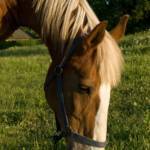Grazing Horses Have Adequate Intake of Most Microminerals

Forage plants derive mineral content from the soil in which they grow. For the most part, horses that have free access to quality grazing will ingest small but adequate amounts of microminerals such as iron, manganese, and cobalt.
In some locations, levels of copper, zinc, iodine and selenium are too low to provide optimal levels of these elements through grazing alone, and a fortified feed or supplement will be needed. Horse owners can have their soil tested to see if supplementation is warranted in their area. For horses that do not require additional calories beyond what pasture provides, but need additional microminerals, a ration balancer is a good choice.
Toxicity from an oversupply of one or more microminerals can occur when owners provide pasture, a fortified grain or ration balancer, and also an additional mineral supplement. Besides being an expensive practice, oversupplementation can actually be harmful in some cases. For example, an oversupply of iron, manganese, or zinc can interfere with absorption of some other minerals needed by the horse. Too much selenium, iodine, or copper might lead to liver damage, muscle problems, lowered immune status, or even death.
To ensure horses have the necessary microminerals in their diets, allow as much pasture access as possible, feed fortified grain products as necessary to meet energy needs for exercise, and turn to ration balancers for horses that do not require additional calories, but need a boost in the micromineral department.








